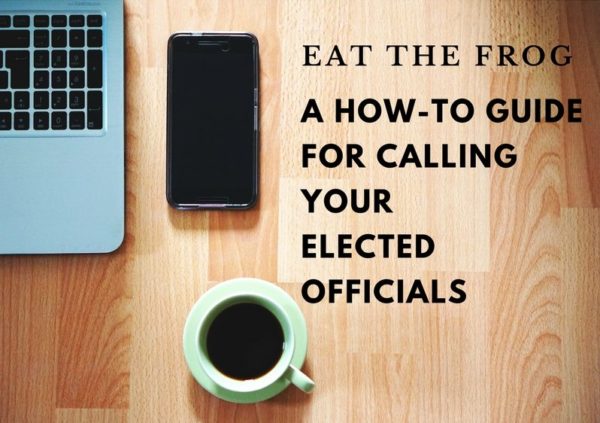Your palms are sweaty. Your throat is dry. You can feel your heart pounding in your chest. You know you need to eat the frog and make the call, but you aren’t sure what to say. You don’t want to feel stupid or say the wrong thing. I remember having all of these feelings the first time I called my elected officials. But like most things, practice makes perfect (or better at least). And at this point, I have quite a lot of practice. I now present to you my how-to guide for calling your elected officials.
Let me first say, I’m proud of you. I know you’re busy. You’re pulled in ten different directions at once. It would be easier to ignore politics and go about your business. But as you know, the issues you care about do impact your life. And I’m glad you’re taking the time to do something. Ok, here we go!
Step 1: Figure out who to call and how to reach them.
I recommend being familiar with the following:
- your two US Senators
- your US Congressperson in the House of Representatives
- your state senator
- your state representative
- your city councilperson and
- your school board member.
If that’s overwhelming, don’t stress. You won’t be calling all of them for every issue, but it’s a good idea to have their numbers saved in your phone. If you live in Louisiana, the Geaux Vote app makes it super easy and will show you all of your elected officials and their contact information. Otherwise, Google is your friend here.
Step 2: Figure out why you’re calling.
You can always call about any issue that matters to you, but for your state and federal representatives, you’ll be most effective calling about issues that are currently being considered. This is where your civics classes become helpful. For example, if the US Senate has already voted on an issue you care about, it would be a good time to call your Congressperson in the House of Representatives to let them know your feelings about how they should vote. You can (and should) certainly call your Senator to praise or scold them, but it’s too late to impact their vote at that point.
Step 3: Figure out what you’re going to say.
This is the part that causes most people to have anxiety. When I first started calling, I typically wrote out an outline of my points so I wouldn’t get distracted or flustered during my call. The conversations go something like this:
Official’s Office: Thank you for calling the office of elected official XYZ.
Me: My name is Ashley Suitt, and I’m a constituent in {zip code}. I’m calling today to ask the Congressperson / Senator to vote for / against bill or issue ABC. I care about this because XYZ.
Official’s Office: I’ll pass that along to elected official XYZ. Is there anything else I can help you with today?
Me: No, thank you. Have a good day.
That’s not so bad, is it?!?
A few things to remember:
- The person answering your call is almost always a staffer, often an intern. There is zero reason to treat this person with anything other than kindness and respect.
- The person you speak to may or may not have the answers your looking for. If you ask a question about a particular issue, don’t be surprised to hear “Elected Official XYZ hasn’t made a statement on that issue” or “I haven’t spoken to Elected Official XYZ about that, but I’d be happy to pass along your thoughts.” Sometimes this is true, sometimes it’s just avoidance, but it is a common response.
- If there is a major issue being considered, the phones will be busy. Your call may go to voicemail. Most of the time you will get an answer if you call right back. You may also have better luck calling local offices instead of DC offices if you are trying to reach your Senator or House Representative.
As you know, because you are alive in 2018, calling is not the only way to reach your elected officials. For most issues, I think it provides the best balance of effectiveness and time efficiency. Writing an email is “easier” in a society where avoid talking on the phone at almost all costs, but it is much easier to ignore than someone’s actual voice on the phone (that’s why we do it, right? No confrontation!). Meeting in person is the very best, and I highly recommend you do it, but it’s not feasible for most people to do often. If you have a compelling story to tell AND you don’t have the chance to meet your elected official in person, I would recommend a hand-written letter (with a related picture if you have one). Staff members do spend time reading these, and they often personally reach your member of Congress.

















Thanks Ashley, this is very helpful!